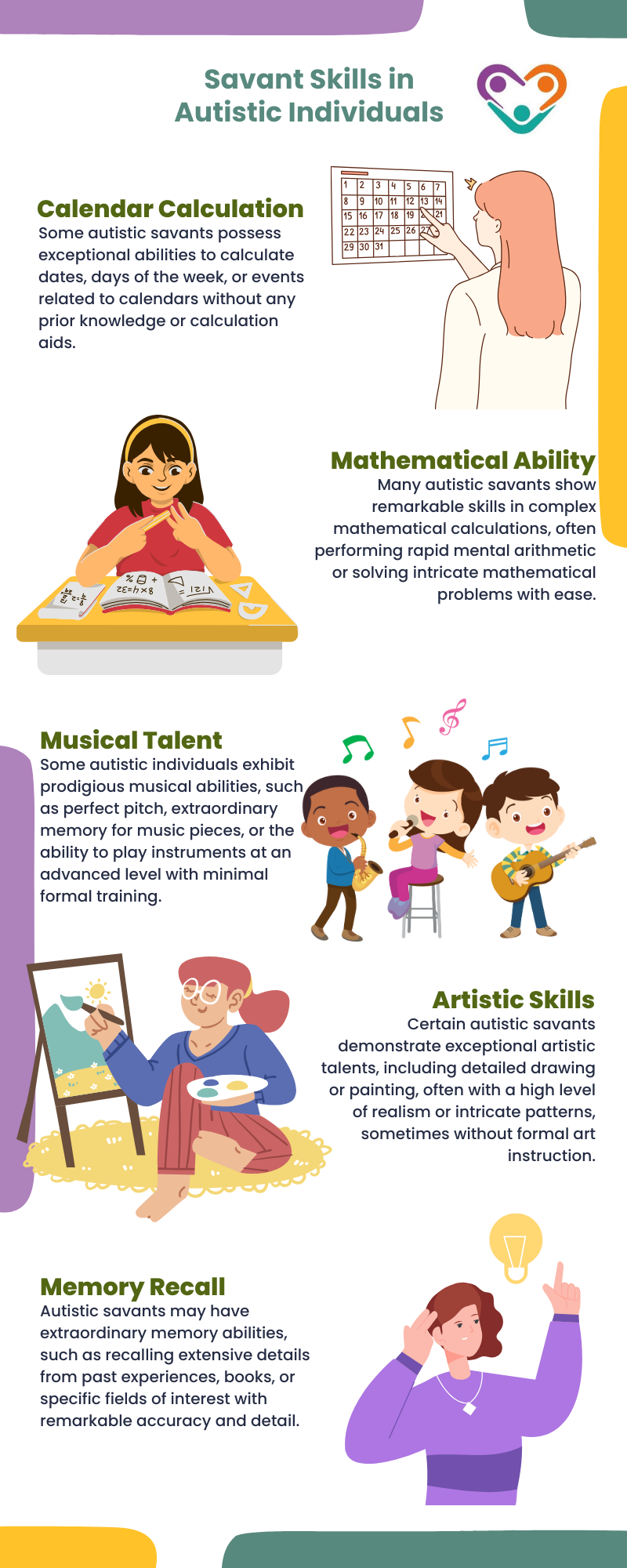Autism spectrum disorder is a neurodevelopmental condition characterized by challenges in social communication, repetitive behaviors, and often, sensory sensitivities. It encompasses a spectrum ranging from mild to severe, and individuals with ASD may exhibit a wide range of strengths and challenges.

Can Autism Make You Smarter?
No, autism itself does not make a person inherently smarter. Intelligence is a complex trait that varies widely among individuals, including those with autism. While some people with autism may excel in certain areas, such as pattern recognition or attention to detail, this doesn’t equate to overall higher intelligence across all domains.
Autism is primarily characterized by differences in social communication and behavior, not by enhanced cognitive abilities in a general sense. However, individuals with autism may demonstrate exceptional abilities or talents in specific areas, often referred to as savant skills. These skills can range from remarkable memory to proficiency in particular subjects like mathematics or music.
It’s important to recognize and support these strengths while also addressing any challenges related to autism. Overall, intelligence in people with autism varies just as it does in the general population, and each person’s abilities should be understood and appreciated in their own right.

Cognitive Abilities in Autism
Many individuals with autism show exceptional abilities in certain cognitive domains. One prominent area is perceptual skills. Research has shown that individuals with autism often have heightened perceptual abilities such as:
- Detail-oriented Processing: People with autism tend to focus intensely on details, sometimes at the expense of seeing the broader picture.
- Pattern Recognition: Some individuals with autism excel in recognizing and remembering patterns, which can be advantageous in certain tasks, such as visual puzzles or mathematics.
Studies have also indicated that this enhanced perceptual processing might contribute to specific talents seen in some individuals with autism, such as artistic or mathematical abilities.
Another notable cognitive trait in autism is intense focus and memory. Individuals with autism often demonstrate remarkable concentration on their interests, sometimes to the point of hyper-focus. This ability can lead to deep knowledge acquisition and expertise in specific areas of interest, sometimes referred to as “special interests” or “obsessions.”
Many individuals with autism exhibit exceptional memory skills, particularly in areas related to their interests. This can include factual recall, procedural memory, or even musical memory.
Autism is also associated with strong analytical thinking and logical reasoning abilities. Some individuals with autism show a preference for systematic and rule-based thinking, which can be advantageous in fields that require precise reasoning and problem-solving.
The “Savant Syndrome”
Within the autism spectrum, a small percentage of individuals exhibit what’s known as “savant syndrome.” Savant syndrome is characterized by extraordinary skills or talents in specific areas, such as mathematics, music, art, or memory. These abilities often coexist with significant challenges in other areas of functioning.
Here are some good examples of savant skills observed among autistic individuals:

It’s worth noting that these skills vary widely among individuals and can sometimes coexist with challenges in other areas of functioning.
Challenges and Considerations
While autism may confer certain cognitive advantages, it’s essential to acknowledge that many individuals with autism also face significant challenges, particularly in social communication, sensory processing, and daily living skills.
The strengths and difficulties associated with autism vary widely among individuals, highlighting the importance of personalized support and understanding.
Sensory Sensitivities
Many individuals with autism also experience sensory sensitivities, where they may be hypersensitive or hyposensitive to sensory stimuli such as sound, light, touch, or texture. These sensitivities can affect daily functioning, causing discomfort or distress in certain environments.
Executive Functioning
Executive functioning refers to a set of cognitive processes that regulate and control behaviors necessary for goal-directed activities. Many individuals with autism struggle with executive function skills, such as planning, organizing, prioritizing tasks, and managing time. Difficulties in executive functioning can impact academic achievement, work performance, and independent living skills.
Supporting Neurodiversity
Understanding and embracing neurodiversity involves recognizing the unique strengths and perspectives that individuals with autism and other neurodevelopmental differences contribute to society. By promoting acceptance and accommodation, we can create inclusive environments where individuals with autism can thrive and maximize their potential.
In educational settings, tailored approaches such as Individualized Education Plans (IEPs) and accommodations can support students with autism in reaching their academic goals while addressing their specific needs. These may include sensory supports, visual aids, structured routines, and social skills training.
In the workplace, accommodations such as flexible schedules, sensory-friendly environments, clear communication strategies, and task modifications can enable individuals with autism to succeed in their careers. Companies that prioritize diversity and inclusion often benefit from the unique perspectives and problem-solving skills of neurodiverse employees.
While autism spectrum disorder presents unique challenges, it can also contribute to enhanced cognitive abilities and strengths in certain domains. The perceptual skills, intense focus, memory capabilities, and analytical thinking associated with autism have been shown to foster talents and expertise in various fields.
Sources:
https://www.appliedbehavioranalysisedu.org/is-autism-associated-with-higher-intelligence
https://autismsomeassemblyrequired.com/does-autism-make-you-smarter
https://www.thetransmitter.org/spectrum/many-children-autism-get-significantly-smarter-time

